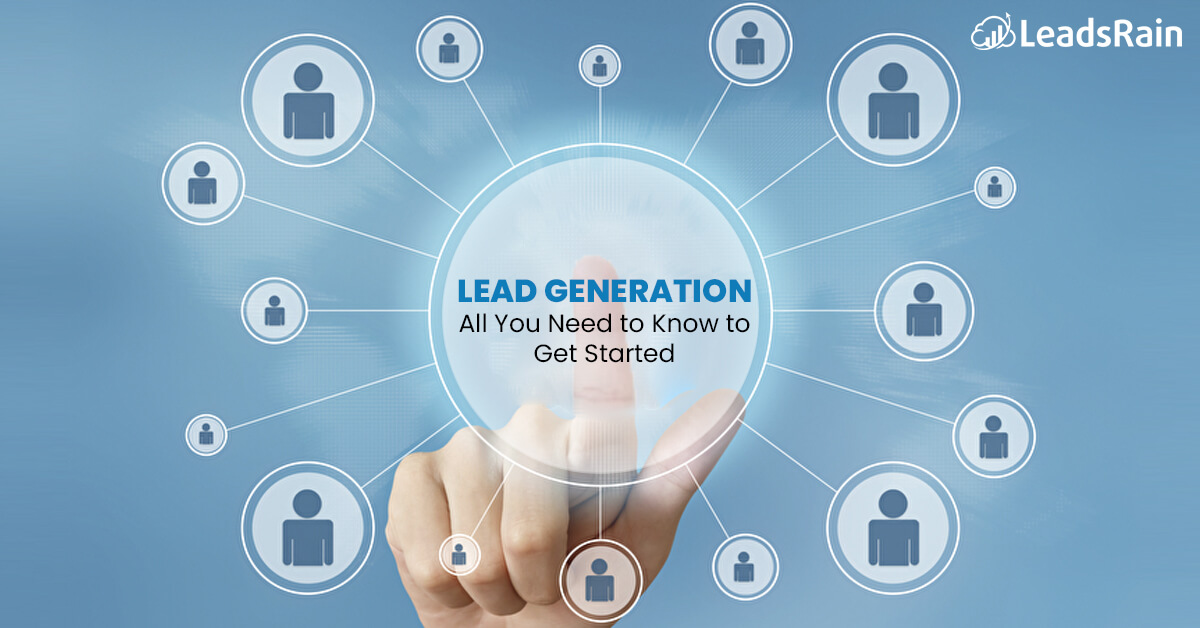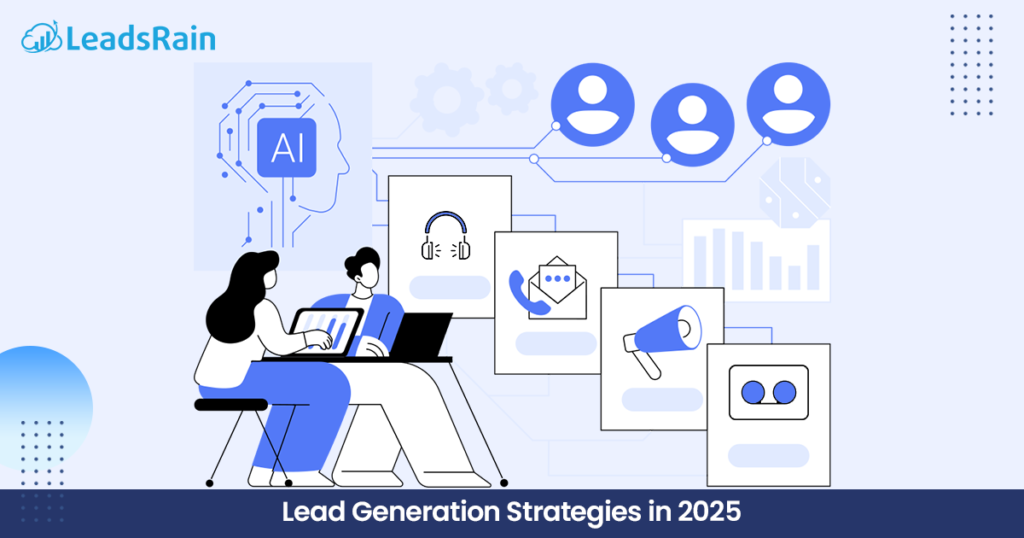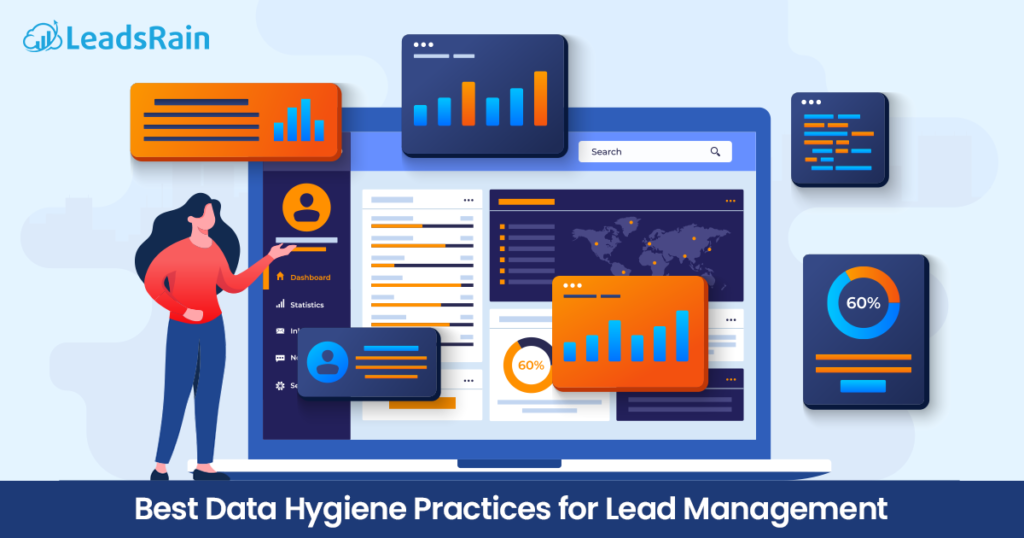Although lead generation has changed much over the past several years, it is still an essential tool for organizations to use to develop customer relationships, produce qualified leads, and ultimately close sales.
No matter the size of the organization, lead creation is beneficial for all types of B2B companies. Lead generation is also ideal for certain B2C sectors with high-involvement transactions, where customers are less likely to purchase immediately and may require some nurturing.
In this article, we will shed some light on Lead generation, especially how Outbound Lead Generation campaigns are important.
What is A Lead?
A lead for a firm is a person who shows some interest in that company’s goods and services. Creating sales leads involves educating potential customers about a business’s offerings in order to generate interest. And the resources utilized to locate potential consumers are sales lead generators.
Leads can change from being a visitor to paying customers at an early stage of the conventional buying cycle. Lead nurturing is crucial, and although lead generation often resembles sales in many ways, it serves a different purpose and demands consideration as such.
What is Lead Generation?
The process of generating inquiries based on consumer interest in a good or service, which ultimately results in sales, is known as lead generation. Lead generation in online marketing often entails gathering a visitor’s contact information using a web form.
The early stages of lead generation were buying lists of names and contact information. The salespeople will next begin making cold calls to these individuals. Today’s technological advancements have made it simpler to create leads based on precise information and criteria. Companies acquire data on prospective customers and develop marketing messaging and sales presentations based on those prospects’ demands. Most likely, both inbound and outbound marketing strategies are used for this. Your sales cycle can become considerably more efficient, and your success rate in acquiring customers can rise if you are good at lead generation.
How Does Lead Generation Work?
Today, creating a website to advertise a company’s offerings is the most typical place for a lead generation strategy to start. The customer may search for a specific good or service, stumble onto these educational websites, and fill out an online request form. Their information is checked and matched, and a lead is then forwarded to the sales team.
We could add that, at least, it is the theory underlying lead generating.
Many lead-generating tactics are available, and while they may appear straightforward and uncomplicated, it can be challenging to implement them successfully. To achieve positive results, businesses must have a highly functional and well-equipped lead-generating plan in place. Lead generation can be quite profitable once it is well established.
What Makes Lead Generation Marketing So Crucial?
Any B2B company or B2C company that sells a product or service that is thought to require a high level of involvement in the purchasing process must embrace lead generation.
At LeadsRain, we have seen that firms that use a sophisticated, well-developed lead-generating strategy may generate 133% more revenue than normal organizations. Thus, it is obvious that this benefits revenue growth.
However, a strong lead generation strategy that generates warm, qualified leads can also boost company morale and productivity. Your sales teams may spend more time selling and less time on prospecting and administrative tasks by using an effective lead-generation process.
In addition, though other departments are likely to be involved in the lead generation process, marketing frequently initiates it.
It will be clear that marketing is actually assisting in the company’s growth if the marketing staff can be observed collaborating with sales to gain additional clients. This can aid in the idea that marketing is no longer viewed as a cost center but rather as a crucial component of the business that contributes to its profitability.
How Crucial Is The Lead Quality?
The disparate goals and KPIs of the marketing and sales teams are sometimes one of the largest obstacles to implementing a lead generation process.
It’s not unusual for marketing teams to be given a “cost per lead” (CPL) target for their campaigns, encouraging them to produce as many leads as possible while staying within the marketing budget.
On the other hand, the sales team frequently receives goals depending on how many leads they convert. The sales staff won’t be able to reach their goals if marketing is funneling a lot of low-quality leads their way. Actually, they would probably prefer to receive fewer, higher-quality leads.
What is A “Qualified” Lead?
A lead must be qualified once it has been produced. As opposed to a lead, a qualified lead has openly expressed interest in using your products and services as a paying customer. Usually, a lead is qualified by gathering more data about it.
Categories of Qualified Leads
Marketing Qualified Lead:
A marketing qualified lead (MQL) is a person or organization that has interacted with the outreach efforts of your marketing team but is not yet ready for engagement from the sales teams. They have expressed interest in your goods and/or services, but you need to learn more about them to give them serious consideration.
Sales Qualified Lead:
A sales-qualified lead (SQL) is a person or organization that has formally shown interest in doing business with you. A sales-qualified lead typically qualifies as such because they voluntarily provided you with information indicating their interest in your goods and/or services.
Product-Qualified Lead:
A Product Qualified Lead (PQL) is a person or organization that has utilized your product(s) and/or service(s) and then expressed interest in purchasing from you on a regular basis. Companies that offer free trials or samples of their goods or services typically have leads that are qualified for their items. Because they have actually tried your product or service and have a high likelihood of conversion, product-qualified leads are important.
Service-Qualified Leads (SQL):
A person or organization who indicates to your customer service or sales staff that they are interested in purchasing your product and/or service is known as a service-qualified lead. Because people are really approaching you and offering to buy whatever it is that you are selling, this is the most qualified kind of lead. An existing customer wishing to upgrade to a more expensive version of your product or service could also be a service-qualified lead.
Lead Generation: Inbound Vs. Outbound
Inbound lead generation differs from outbound lead generation in that inbound efforts bring leads in while outbound efforts concentrate on contacting potential leads.
Inbound lead generation aims to encourage leads to contact your company on their own. Typically, it entails using websites, blogs, valuable content, or social media posts to draw in leads. While Outbound lead generation entails making direct contact with potential customers through phone calls, emails, direct mail, or social media sites like LinkedIn. It entails your staff personally addressing decision-makers on behalf of your company.
Outbound Lead Generation: What is it?
Engaging with potential clients who may not be aware of your product or service is known as outbound lead generation. Generate interest in a company’s goods or services and create a sales pipeline, it entails making outbound calls or sending other messages to a target demographic of potential leads.
Businesses can utilize a variety of communication channels to generate outbound leads, including calls, email marketing, social selling, social media, TV and radio advertisements, direct mail, and more.
Advantages of Outbound Lead Generation
Outbound lead creation can be just as effective as inbound when used in conjunction with the appropriate tools and methods. Some of the key advantages of outbound lead generation for businesses are listed below:
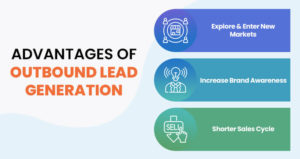
1. Explore and Enter New Markets
You can expose your company to new markets that may not be familiar with what you have to offer by going outbound. With real-time data, your sales staff can monitor which approaches are effective and ineffective as they conduct hundreds of cold calls each day.
2. Increase Brand Awareness
To raise brand awareness and improve your exposure, use outbound strategies to connect with both a broad and specific target audience.
3. Shorter Sales Cycle
Outbound lead generation is a fantastic technique for hyper-target leads who are prepared to make a transaction.
Outbound Leads Generation: Top 3 Result-oriented Outbound Lead Generation Tactics
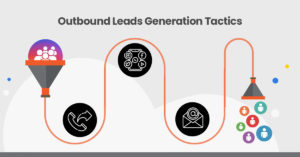
1. Outbound Calling:
Outbound calling was considered to be dead, much as cold emailing was.
Contrary to popular belief, cold calling can be really useful for some businesses. Outbound calling does have some benefits, despite not being the most sophisticated or scalable type of communication.
One of the most personable strategies you can use, aside from getting out and meeting a lead in person, is contacting them.
But keep in mind: Avoid acting like a telemarketer that constantly spams people. In order to pique curiosity, you should be prepared to offer a tailored message and some initial value. You’ll be more likable than a telemarketer if you follow those two guidelines, at the very least.
Also Read: Cold Email vs Cold Calling
2. Social Media: Facebook, Twitter, and LinkedIn
Social media virtual networking has advanced significantly. But since LinkedIn is more of a business-focused social media, I’d prefer to start there.
LinkedIn is most likely going to be your best option in terms of social media.
Linkedin, Twitter, and YouTube are determined to be the most successful outbound marketing platforms. According to a Statista study, 66% of B2B marketers said LinkedIn was useful, with Twitter coming in second place with 55%. On the other hand, Facebook only earned a 30% approval rating.
Spam is a drawback of using social networking sites like LinkedIn for outreach. And random people trying to connect with you on LinkedIn to pitch you their services are well known.
The worst part, though? Most people who are seeking to connect with strangers don’t personalize their messages. On the plus side, this may make it simpler for those who perform exceptional outreach to stand out.
3. Cold Email
Email is the top revenue-generating medium for 59% of B2B marketers, according to BtoB Magazine. Because it generates such high-quality leads, several businesses rely only on cold email as their main lead generation channel.
It can also be for you if done properly. Given that companies and individuals still check their email frequently throughout the day in 2020, it is clear that email is far from being dead.
Cold emails are more effective for B2B organizations, as I said while outlining the benefits of outbound marketing methods.
Email’s adaptability is arguably its strongest advantage as a tool for outbound campaigns. You can email just about anyone you could possibly imagine. And there are countless automated processes you can integrate with your email systems.
Also Read: Text Messaging Marketing VS Mass Email Marketing
Ready to Grow your Business with Outbound Lead Generation? – Try LeadsRain
You can expand your lead pool quickly to engage a larger audience and boost sales with the appropriate outbound lead-generating tactics. This is significantly simpler for your sales staff to accomplish when you implement the appropriate sales communications technology.
Try LeadsRain – A smart place to start is by equipping your team with an omnichannel outreach platform with AI-powered solutions and sales tools.
With the help of LeadsRain’s predictive dialer software, you can make more calls daily, link the platform to your CRM to automate contact data input, and ensure customer satisfaction throughout the customer journey with the omnichannel outbound approach.
Ready to see how our outbound lead generation services can help you grow? Connect with us at support@leadsrain.com or schedule an appointment now with our experts.
